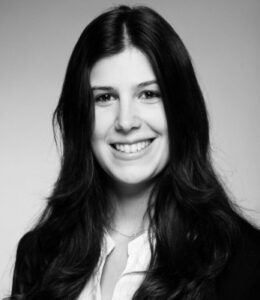An interview with Audrey Lesperoy, Philanthropy Adviser, Fondation de Luxembourg
Could you tell us more about your background? What are your current responsibilities within Fondation de Luxembourg?
 I am a philanthropy adviser. I graduated in law and I also hold an advanced master’s degree in public notary law. I joined Fondation de Luxembourg in January this year after having worked in the insurance sector in Luxembourg.
I am a philanthropy adviser. I graduated in law and I also hold an advanced master’s degree in public notary law. I joined Fondation de Luxembourg in January this year after having worked in the insurance sector in Luxembourg.
My role as philanthropy adviser is to advise donors on setting up and structuring their own foundation that will be sheltered by Fondation de Luxembourg.
In addition, I represent the Fondation de Luxembourg within the Transnational Giving Europe network and I am in charge of handling cross-border donations.
2. Could you describe how Fondation de Luxembourg is involved in inclusive finance?
Fondation de Luxembourg’s mission is to promote the involvement of individuals and companies in philanthropic matters. To that end, Fondation de Luxembourg is entitled to accommodate foundations under its aegis, which are active in one or several of the following areas: health and research, poverty alleviation and social cohesion, culture and diversity, universal education, and biodiversity and climate change. Those sheltered foundations, flexible structures that are independent from each other, do not have any legal personality but offer all advantages of an independent foundation of public utility without the administrative burdens.
To pursue the realisation of their object, those foundations receive an endowment which will cover their needs. Depending on the type of financing structure and the duration of the sheltered foundation, some of them will have to invest whole or part of their capital, as the revenues produced by this capital will be needed and used to support philanthropic projects. Therefore, the investment side is also important.
Taking into account this, Fondation de Luxembourg recommends the founders of sheltered foundations to adopt a socially responsible investment (SRI) policy so as to safeguard, as far as possible, a degree of cohesion between the philosophy of its investments on one hand, and the aims pursued by the sheltered foundations in the public interest on other hand. The sheltered foundations may thus invest in and support inclusive finance projects. They can also invest in microfinance investment funds.
Fondation de Luxembourg is currently reviewing its SRI policy and advocates SRI to the different banking institutions in charge of the custody and management of the endowments of the sheltered foundations. In addition, Fondation de Luxembourg has also incorporated the Sustainable Development Goals (SDG) into its internal process. It systematically examines which SDGs the project that donors are or will be supporting will meet.
What is your key interest in inclusive finance?
I am particularly interested in microfinance and its development via socially responsible investment funds. By investing in socially responsible funds, private individuals can help bring about positive changes and contribute to reinforcing inclusive finance.
For you, what are the biggest challenges for inclusive finance and how can Luxembourg and InFiNe.lu contribute to them?
One of the biggest challenges is promoting awareness of inclusive finance. The concept, and how it differs from microfinance, must be explained to the greatest number of people. This is what InFiNe.lu endeavours to do through its activities.
InFiNe is the Luxembourg platform that brings together public, private and civil society actors involved in inclusive finance. The value of InFiNe lies in the wide range of expertise characterised by the diversity of its members.
With the support of

Inclusive Finance Network Luxembourg
39, rue Glesener
L-1631 Luxembourg
G.-D. de Luxembourg
Tel: +352 28 37 15 09
![]()
R.C.S. : F 9956
Legal notice
Privacy notice
Picture 1 © Pallab Seth
